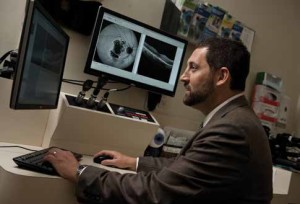Macular Degeneration and Genetics: SHOULD YOU GET TESTED?
by Stephen G. Schwartz, MD, MBA
Age-related macular degeneration is the leading cause of irreversible visual loss among the elderly in the US. The causes of macular degeneration are poorly understood but the disease does seem to run in families, which suggests that there may be a genetic (or hereditary) component. Genetic testing does exist for macular degeneration. Should patients have this testing performed?
This is not a straightforward question. There are two major types of genetic diseases. The first is called a simple genetic disease, in which there is a single gene that determines whether or not a person develops the disease. If the person has a “normal” gene, then no disease develops, but if a patient has an “abnormal” gene, also called a mutation, then the disease may develop. Simple genetic diseases include cystic fibrosis, Tay-Sachs disease, sickle cell anemia, and others. Generally speaking, it makes more sense to recommend genetic testing for patients at risk for simple genetic diseases, because the presence of a mutation suggests a high risk of developing the disease.
The other type of genetic disease is called a complex genetic disease, in which there are multiple genes, plus environmental influences, that determine whether or not a person develops the disease. This is not a question of “normal” versus “abnormal” genes, so physicians and scientists generally do not use the word “mutation” in this situation. Instead, certain “variants” of genes (often called “risk variants”) are more likely to be associated with the onset of disease. Generally speaking, it does not make sense to recommend genetic testing for patients at risk for complex genetic diseases, because the presence of one or more risk variants does not necessarily mean that a person will develop the disease.
For example, there are at least 19 different genes that are known to be associated with macular degeneration. In addition, certain environmental exposures, including cigarette smoking, and foods (or vitamins) eaten, play a role. How many “risk variants,” plus how many environmental exposures, does it take to develop macular degeneration? At this time, the answer is unknown. For these reasons, genetic testing does not give sufficient information in order to accurately predict whether or not a patient will develop macular degeneration, so at this time I do not recommend this test to my patients.
Patients who already have macular degeneration may benefit from a specific nutritional supplement, available over the counter under the names AREDS (standing for “Age-Related Eye Disease Study”) or AREDS 2. These supplements contain antioxidants (including lutein or beta-carotene) as well as zinc. There is very good scientific evidence that AREDS or AREDS 2 supplements reduce the risk of developing progressive disease in patients who already have macular degeneration.
There is some evidence that the supplements do not work equally well in all patients, and that some of this difference may be predicted by certain genetic risk variants. Should patients undergo genetic testing to determine whether they take AREDS or some other supplement?
This is an important question, because some recent scientific evidence suggests that genetic testing may be useful in order to predict which supplements are best for each individual patient. However, this recent scientific evidence (suggesting the use of genetic testing prior to starting supplementation) is not as strong as the original clinical trials that demonstrated the efficacy of AREDS and AREDS 2. This is currently a controversial subject among ophthalmologists. At this time, I do not recommend the use of routine genetic testing in patients with macular degeneration, in order to predict disease progression or to guide nutritional supplementation.
In summary, there is a complex relationship between genetics and certain aspects of macular degeneration. This is an important area of research, and Bascom Palmer Eye Institute is participating in a long-range genetics research study to learn more about this relationship. However, at this time, I do not recommend routine genetic testing for patients with macular degeneration.


Leave a Reply
Want to join the discussion?Feel free to contribute!